19 Best Erlang Developers for Your Needs
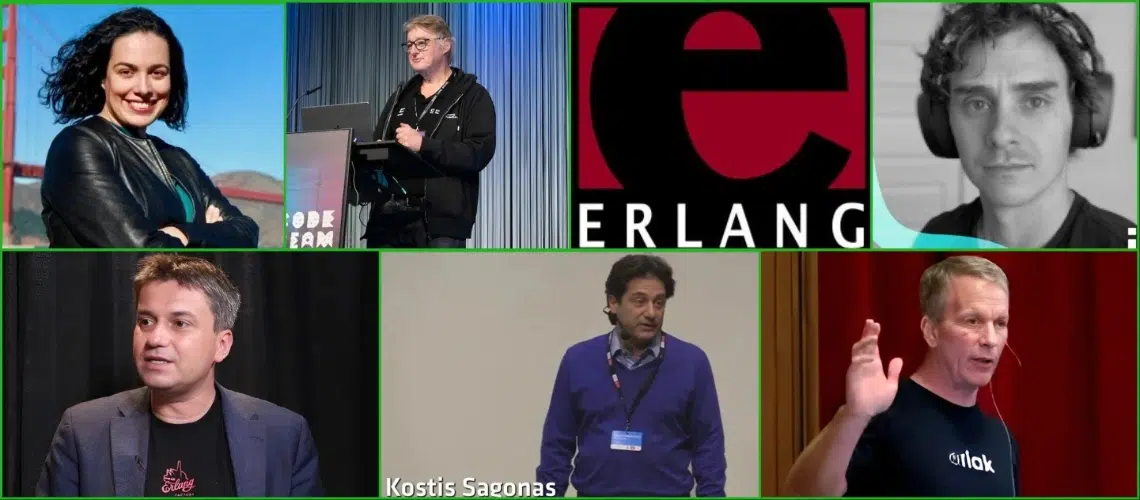
Erlang’s ecosystem thrives thanks to talented developers who push the boundaries of concurrent, fault-tolerant systems.
Over the last years, these individuals have led open-source projects, scaled world-class systems, written influential content, and guided communities. Below is an updated list of the best Erlang developers (in no particular order) – including open-source contributors, tech founders, bloggers, corporate engineers, and competition winners.
- Fred Hébert
- Kenneth Lundin
- Loïc Hoguin
- Francesco Cesarini
- Lukas Larsson
- Feng Lee
- Robert Virding
- Tristan Sloughter
- Björn Gustavsson
- Steve Vinoski
- Ulf Wiger
- Scott Lystig Fritchie
- Kostis Sagonas
- Mickaël Rémond
- Jesper Louis Andersen
- Miriam Peña
- Peer Stritzinger
- Brujo Benavides
- Richard Carlsson
Now, let’s delve deeper into their remarkable contributions and impact.
Fred Hebert

Nationality: Canadian
Fred is an influential Erlang educator and open-source contributor.
He authored Learn You Some Erlang for Great Good! and Erlang in Anger, accessible books that have trained countless developers. Fred co-founded the Erlang Ecosystem Foundation and serves on its board, driving community growth. He’s also a maintainer of Rebar3 (Erlang’s build tool) and libraries like recon (for debugging). Professionally, Fred has built resilient systems at companies like Heroku and Postmates, often bringing Erlang/OTP expertise into cloud infrastructure.
His posts and conference talks on fault-tolerance and testing continue to shape industry best practices.
- Linkedin: Fred Hébert
- Github: ferd
- Website/Blog: ferd.ca
Kenneth Lundin
Nationality: Swedish
Kenneth has been the manager and guiding hand of the Erlang/OTP development team at Ericsson for over twenty years. A seasoned software engineer, Kenneth joined the OTP project in 1996 during its early open source days and became head of the team by 1998.
Under his stewardship, Erlang/OTP has seen regular releases, improved documentation, and a growing open-source community. Kenneth was one of the pioneers of using C++ at Ericsson, but he embraced Erlang for its concurrency benefits. He often provides “OTP Team Updates” at Code BEAM conferences, sharing new features and inviting community feedback. Colleagues describe him as a “hands-on technical manager” – he not only manages priorities for OTP’s evolution but also dives into technical discussions on the VM, tools, and language.
After 45+ years at Ericsson (27 of those on OTP), Kenneth’s legacy is an Erlang/OTP platform that remains industrial-grade and continuously improving.
- Linkedin: Kenneth Lundin
- Github: KennethL
Loïc Hoguin
Concurrency is not parallelism. And Erlang gives you both — if you know how to use it.
Nationality: French
Loïc is the author of the Cowboy web server, Ranch TCP library, Gun HTTP client, and the Erlang.mk build tool.
As founder of the open-source company Nine Nines, he has made Erlang a powerhouse for web and real-time services. Loïc co-founded SpawnFest (an annual Erlang/BEAM hackathon) and wrote “The Erlanger Playbook”, sharing best practices with the community. He remains an active maintainer, ensuring Cowboy supports modern web standards (WebSocket, HTTP/2) with high performance.
His contributions, training, and community talks have cemented him as a leading voice in the Erlang world.
Francesco Cesarini
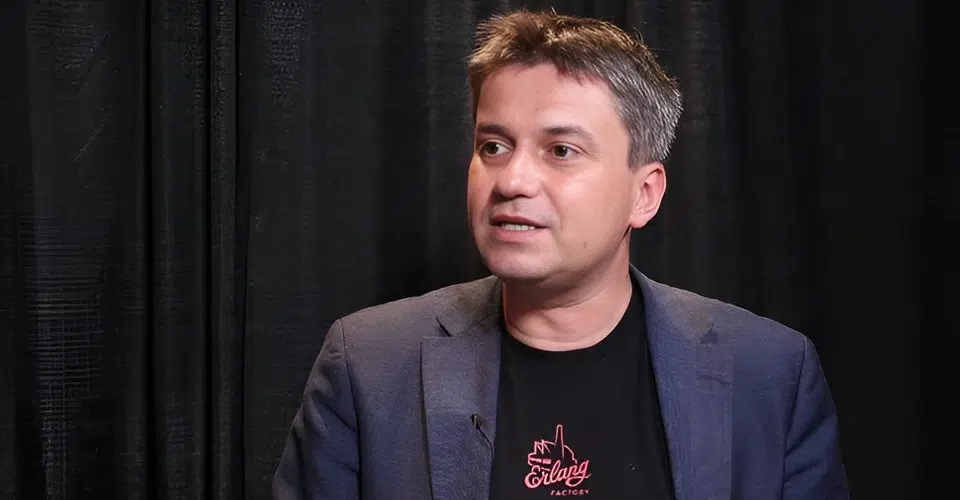
Nationality: Italian
Francesco is the founder and Technical Director of Erlang Solutions and a true Erlang evangelist.
He began his career at Ericsson’s Computer Science Lab alongside the inventors of Erlang and has spent 25+ years architecting telecom, messaging, and payment systems in Erlang. Francesco co-authored the books Erlang Programming and Designing for Scalability with OTP, widely used by developers. As an educator, he has taught Erlang/OTP at Oxford University and guided many through training programs. He also helped launch the Erlang Ecosystem Foundation to foster community collaboration.
Francesco’s leadership and constant advocacy have been critical in Erlang’s global adoption.
- Linkedin: Francesco Cesarini
- X (Twitter): @FrancescoC
Lukas Larsson
Nationality: Swedish
Lukas is a core Erlang/OTP developer known for solving complex VM performance problems. After joining Ericsson’s OTP team as a consultant around 2012, he has focused on the Erlang VM internals for the past 8+ years.
Lukas was one of the principal engineers behind Erlang/OTP’s new JIT compiler, which debuted in OTP 24 and significantly boosted execution speed. He also improved the runtime’s scaling on multicore systems – for example, optimizing how the scheduler handles code loaded with new type information to leverage the JIT better. Prior to OTP, Lukas spent about a decade at Erlang Solutions applying Erlang across different industries, which gave him practical insight into where the VM needed tuning.
He remains an active open-source contributor (handling many OTP GitHub issues and pull requests) and often appears alongside Kenneth Lundin in “Ask OTP Anything” panels. Lukas’s work ensures that Erlang/OTP keeps pace with modern hardware and performance expectations.
- Linkedin: Lukas Larsson
- X (Twitter): @garazdawi
- Github: garazdawi
Feng Lee
Nationality: Chinese
Feng is the founder and CEO of EMQ Technologies, creators of EMQX, the world’s most scalable open-source MQTT message broker written in Erlang. He and his team in Hangzhou, China, have been using Erlang for telecom and IoT software since 2006, drawn by its concurrency and reliability for handling massive device connections.
Under Feng’s leadership, EMQX has achieved industry-leading performance – recent versions can support 100 million+ IoT device connections in a cluster, a testament to Erlang/OTP’s scalability. Feng has positioned EMQX as a global player (EMQ is an OASIS and Eclipse Foundation member), bringing Erlang into modern cloud-native infrastructure (with Kubernetes operator support, etc.). He often speaks about MQTT and has grown a worldwide community around EMQX’s Erlang core.
By combining Erlang’s strengths with IoT requirements, Feng Lee has demonstrated how Erlang can power the next generation of connected devices and services.
Robert Virding
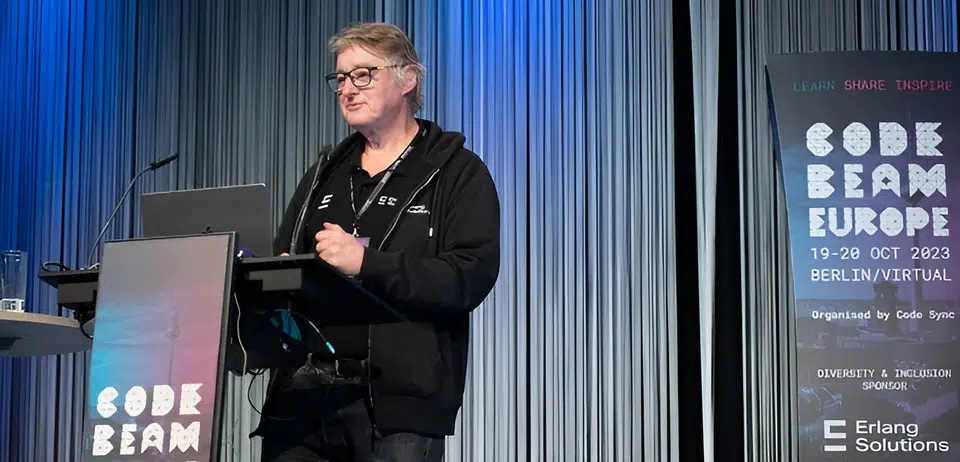
Nationality: Swedish
Robert is a co-inventor of the Erlang language and one of its earliest implementers.
At Ericsson’s lab, he contributed much of Erlang’s original libraries and even parts of the compiler. Robert later co-founded Bluetail, one of the first Erlang startups, which proved Erlang’s commercial viability. He remains active as Principal Language Expert at Erlang Solutions, where he mentors developers and teaches OTP principles. Robert also created LFE (Lisp Flavoured Erlang), marrying Lisp syntax with the BEAM runtime.
Having co-authored the first book on Erlang and with decades of experience in garbage collection and language design, Robert is an esteemed elder statesman in the community – still blogging, speaking, and coding to inspire the next generation.
- Linkedin: Robert Virding
- X (Twitter): @rvirding
- Github: rvirding
Tristan Sloughter
Nationality: American
Tristan is a longtime Erlang developer best known for co-creating Rebar3 (with Fred Hébert) to simplify building and releasing Erlang projects.
He also developed Relx for packaging Erlang releases, making deployment easier. Tristan has been deeply involved in community infrastructure: he helped establish the Erlang Ecosystem Foundation and contributes to its Observability Working Group. After using Erlang at companies like Heroku and Postmates, Tristan now works at Splunk on OpenTelemetry integrations, bringing Erlang’s telemetry data to modern tracing systems. He frequently gives talks and writes about adopting Erlang in organizations.
Tristan’s work on build tools and tracing has improved developer experience for the entire ecosystem.
- Linkedin: Tristan Sloughter
- X (Twitter): @t_sloughter
- Github: tsloughter
Björn Gustavsson
Nationality: Swedish
Björn has been a core developer of Erlang/OTP at Ericsson for decades and is often regarded as the technical lead of the OTP team.
He joined the project in its early stages (circa 1996) and has worked on everything from the runtime system to language features. Björn specializes in the Erlang compiler and led efforts to introduce the JIT (Just-In-Time) compiler in OTP 24+, a milestone that significantly improved BEAM performance. He has guided many optimizations (like improved bit-level handling and binary construction) in recent releases.
As a member of the Erlang Foundation’s technical council, Björn continues to set the direction for Erlang’s evolution. His quiet, steady contributions ensure that Erlang/OTP remains robust and modern for the community.
- Linkedin: Björn Gustavsson
- X (Twitter): @bgustavsson
- Github: bjorng
Steve Vinoski
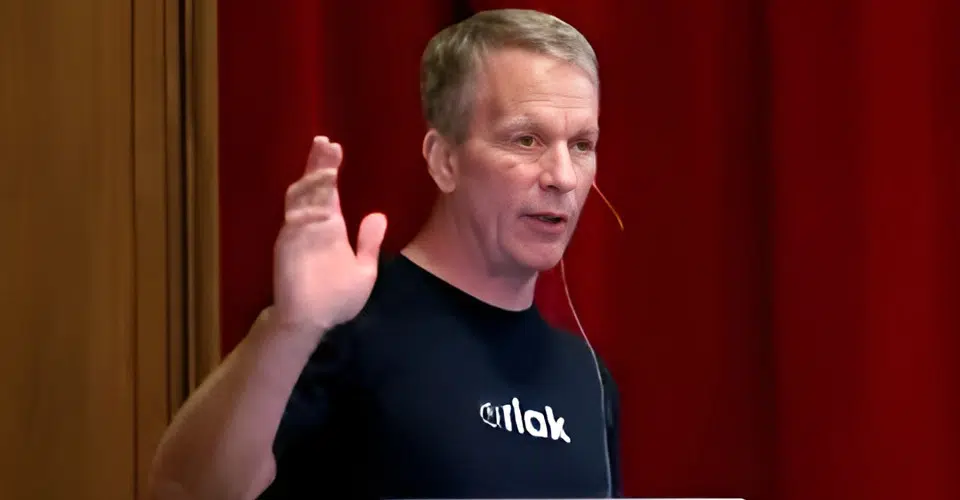
Nationality: American
Steve is a distributed systems expert and longtime Erlang advocate. After gaining fame co-authoring “Advanced CORBA Programming in C++”, Steve embraced Erlang’s simplicity for building scalable services.
He became a committer on Yaws, one of the first high-performance Erlang web servers. Over the last decade, Steve applied Erlang at Basho Technologies (where he worked on the Riak database) and now at Arista Networks building networking systems. He has written influential articles contrasting RPC vs. REST and often highlights Erlang’s strengths in his IEEE “Internet Computing” column. Steve’s breadth of experience – from telecom to media streaming – and his advocacy for Erlang’s concurrency have helped bridge enterprise middleware communities with the BEAM world.
He remains an active conference speaker and blogger, demystifying scalable architecture with Erlang.
- Linkedin: Steve Vinoski
- Github: vinoski
Ulf Wiger
Nationality: Swedish
Ulf is one of the most experienced Erlang engineers, known for his early adoption and continued innovation. He was arguably Erlang’s first commercial user outside Ericsson – purchasing a license in 1993 and deploying Erlang in a North American telecom system. Ulf spent 13 years at Ericsson, where he became a chief architect for large-scale carrier-grade systems built on OTP.
Later, he served as CTO of Erlang Solutions, mentoring many new Erlang projects. Ulf has contributed several open-source libraries/utilities over the years – notably gen_leader and jobs – addressing common distributed problems. In recent years, he ventured into blockchain, implementing a blockchain in Erlang and speaking at GOTO about it. Ulf also co-founded Feuerlabs to explore Erlang in embedded and IoT. With over 30 years in telecom and a second career in emerging tech, Ulf remains an active voice on Erlang forums.
His posts and forum answers often provide “wisdom of the ages” on how to architect fault-tolerant systems the Erlang way.
Scott Lystig Fritchie
Nationality: American
Scott is a veteran Erlang developer recognized for his work on distributed databases and performance tooling. At Basho Technologies, Scott was a senior engineer on Riak, the distributed KV store powered by Erlang – he helped design Riak’s core and wrote pivotal components like the active anti-entropy subsystem.
Scott is also known for integrating Erlang with systems-level instrumentation: he created DTrace probes for the BEAM and other debugging aids. He has co-chaired the ACM Erlang Workshop and remains on its steering committee, encouraging research in the Erlang community. Scott frequently presents at conferences, often on topics like “Measuring and profiling Erlang code” or unique applications of the actor model. In the past few years, he has worked with technologies like OSv and consulted on using Erlang in fintech. Scott’s contributions blend academic rigor with practical know-how.
An active member on mailing lists and forums, he’s quick to help others with tricky concurrency bugs or performance optimizations. His dedication to the craft is such that he recently noted he’s seeking new challenges specifically in Erlang/Elixir environments – a testament to his passion for the BEAM.
- X (Twitter): @slfritchie
- Github: slfritchie
Kostis Sagonas
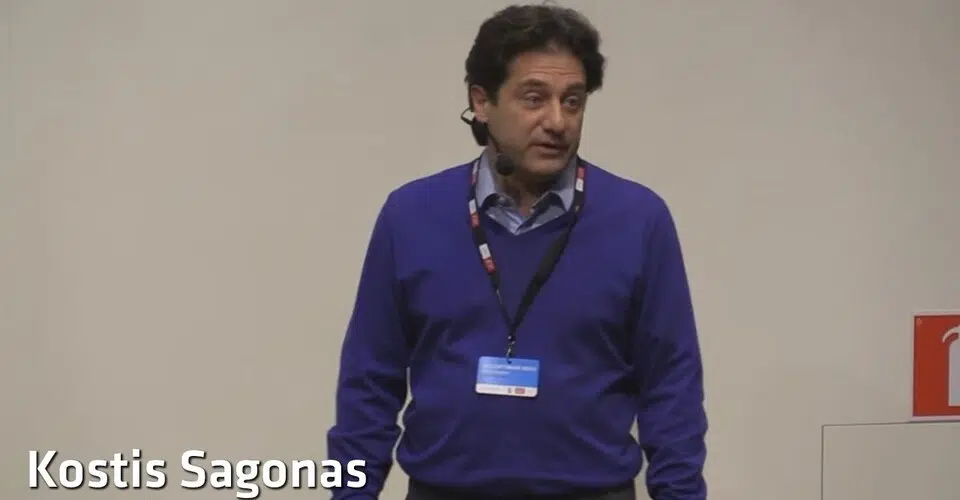
Nationality: Greek
Kostis is the academic turned toolmaker who has greatly enhanced Erlang’s tooling and language features. Since 1999 he’s been involved in Erlang’s development, notably leading the HiPE project that added a native code compiler to Erlang/OTP. Kostis and his students introduced pivotal language extensions such as bit-level pattern matching and the modern type/spec notation for documenting functions.
He is perhaps best known as the creator of Dialyzer, Erlang’s static analysis tool that finds type errors and discrepancies. He also co-authored PropEr, an open-source property-based testing framework inspired by QuickCheck. Through these tools (Dialyzer, Typer, Concuerror, etc.), Kostis has brought correctness and bug-finding capabilities to Erlang developers.
He continues to split his time between academia and practical development, ensuring Erlang’s ecosystem benefits from the latest research in static analysis and verification.
- Github: kostis
Mickaël Remond
Nationality: French
Mickaël is a pioneer of Erlang in messaging and XMPP technologies. He founded ProcessOne in 2005 and created ejabberd, the open-source Erlang XMPP server that proved Erlang’s capacity for massive scalability in chat systems. Mickaël has over a decade of community involvement and is one of the world’s leading experts in instant messaging with Erlang.
Under his leadership, ejabberd achieved record benchmarks (millions of concurrent users on a single node) and has been adopted in enterprise and government projects. He has delivered 50+ talks worldwide on ejabberd, messaging, and real-time systems. Notably, Mickaël was named “Erlang User of the Year” in 2004 for his contributions. He remains active maintaining ejabberd, exploring push notification services, and writing about high-volume messaging.
His work demonstrated Erlang’s advantages in reliability and concurrency long before chat apps were mainstream.
- Linkedin: Mickaël Rémond
- X (Twitter): @mickael
- Github: mremond
- Website/Blog: mickaelremond.com
Jesper Louis Andersen
Nationality: Danish
Jesper is a renowned Erlang expert with a passion for applying academic concepts in real systems. He created eTorrent, an experiment implementing the BitTorrent protocol in Erlang to prove its suitability for peer-to-peer networks. Jesper has contributed to numerous open-source projects, from a GraphQL implementation in Erlang to libraries like a circuit-breaker (Fuse) for fault tolerance.
As a former Erlang Solutions consultant and a frequent conference speaker, he shares deep insights on BEAM performance, garbage collection tuning, and concurrency patterns. Jesper is also known for his thoughtful answers on StackOverflow and mailing lists – often illuminating how Erlang’s design solves complex problems. He has worked in diverse domains (advertising tech, blockchain, etc.), consistently advocating for Erlang where reliability and concurrency are paramount.
With his cross-language background, Jesper often draws interesting comparisons, but Erlang remains his tool of choice for building practical fault-tolerant systems.
- Linkedin: Jesper Louis Andersen
- X (Twitter): @jlouis666
- Github: jlouis
Miriam Pena

Nationality: Mexican
Miriam is a veteran Erlang engineer and a champion for diversity in the BEAM community. She spent over 16 years building scalable systems in Erlang – from telecom projects in Detroit to real-time bidding ad infrastructure in San Francisco. As a Staff Engineer at AdRoll (NextRoll), she designed critical parts of their ad-serving platform using Erlang for high throughput processing.
Miriam co-founded the Erlang Ecosystem Foundation and served on its board, focusing on outreach and education. She also organized the SF Erlang & Elixir meetup, fostering local community growth. Miriam frequently speaks at conferences about performance tuning and “BEAM Extreme” tricks, sharing lessons from running Erlang in production. She recently joined WhatsApp (Meta) to work on messaging infrastructure, coming full circle to the tech that inspired her career.
As a visible female leader in a male-dominated field, Miriam has mentored new Erlangers and advocated for inclusive, supportive community practices.
- Linkedin: Miriam Peña
- X (Twitter): @miriampena
- Github: miriampena
Peer Stritzinger
Nationality: German
Peer is an entrepreneur bringing Erlang to the world of embedded systems and IoT. He is the creator of GRiSP, a hardware platform and framework for running Erlang on bare-metal embedded devices.
As founder and CEO of Peer Stritzinger GmbH, Peer has spent over a decade applying Erlang in automotive and industrial scenarios – proving that the BEAM VM can run reliably even on small microcontroller boards. His company’s solutions integrate Erlang from device firmware up to cloud services, showcasing a unique “full-stack” IoT approach with one technology. Peer participates in EU research projects to extend Erlang’s use in smart cities and automotive safety, often pushing the envelope of what Erlang can do on constrained hardware.
He also contributes to open-source and shares expertise at conferences. By bridging embedded engineering and Erlang, Peer has opened new frontiers for using OTP’s robustness beyond the data center.
- Linkedin: Peer Stritzinger
- X (Twitter): @peerstr
- Github: peerst
Brujo Benavides
Nationality: Argentine
Brujo is a well-known Erlang blogger, open-source contributor, and community mentor. An Erlang developer for nearly 15 years, Brujo currently works at NextRoll in Barcelona building scalable systems. He’s famous for his enthusiastic blogging on “Erlang Battleground” and Medium, where he demystifies tricky aspects of Erlang and OTP.
Brujo co-authored the book Adopting Erlang (sharing strategies for teams to embrace Erlang) and is an active trainer – he’s a member of the Education Working Group in the Erlang Ecosystem Foundation, mentoring developers through exercises and workshops. He also consistently aced the BEAM Quiz at conferences (until they retired it due to his domination!). Brujo’s contributions include tools like elvis (an Erlang linter) and hank (dead code detector) which help teams improve legacy codebases.
Through humor, patience, and deep knowledge, he has onboarded many newcomers to the Erlang way of thinking.
- Linkedin: Brujo Benavides
- X (Twitter): @elbrujohalcon
- Github: elbrujohalcon
Richard Carlsson
Nationality: Swedish
Richard is one of the most recognizable “stdlib-level” contributors in Erlang, with a track record that spans both tooling and language evolution. He is widely credited as the author of EDoc (documentation) and EUnit (unit testing), which have become default building blocks for Erlang teams that care about maintainability and testability.
He also worked deeply with Erlang syntax tooling. Erlang/OTP’s Syntax Tools documentation includes erl_tidy, a formatter and code tidier built to rewrite and reformat code without losing comments, and later OTP release notes explicitly point to Richard as the original author and current maintainer of erl_tidy after it was removed from OTP. His open-source work continues on GitHub, including Erlang utilities and long-lived libraries.
- Linkedin: Richard Carlsson
- X (Twitter): @rich_4711
- Github: richcarl
Wrap Up
These experts represent exceptional talent, making them extremely challenging to headhunt. However, there are thousands of other highly skilled IT professionals available to hire with our help. Contact us, and we will be happy to discuss your hiring needs.
Note: We’ve dedicated significant time and effort to creating and verifying this curated list of top talent. However, if you believe a correction or addition is needed, feel free to reach out. We’ll gladly review and update the page.
Frequently Asked Questions
No, Erlang is still used in telecom, messaging, and distributed systems. It has a smaller community compared to newer languages, but it remains relevant in industries needing high reliability.
Erlang developers usually cost between $50 and $120 per hour depending on experience, location, and project scope.
They design and optimize fault-tolerant systems, help migrate legacy Erlang code, improve scalability, and advise on performance tuning for distributed applications.
Yes, because Erlang is a niche language with fewer active developers. Companies often work with specialized agencies or freelance platforms to access talent.
Good options include Upwork, Toptal, Fiverr, and niche developer networks where functional programming experts list their services.
